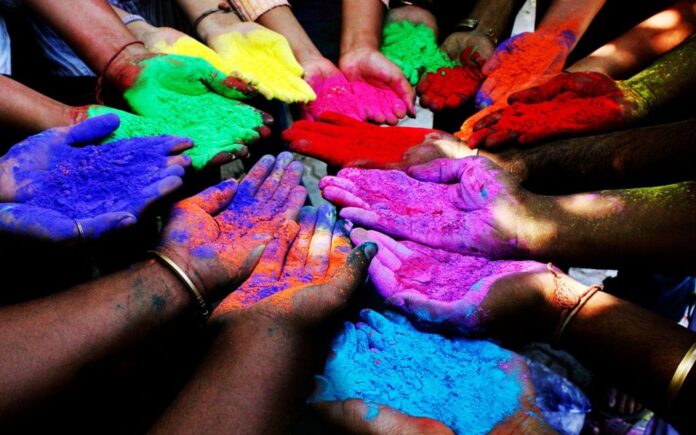A Self-Help Group (SHG) in Tripura has embarked on a remarkable journey of crafting herbal ‘abir’ for Holi celebrations. This initiative not only showcases the ingenuity and resourcefulness of women but also highlights the potential of traditional knowledge in fostering sustainable livelihoods and promoting environmental conservation.
Holi, the festival of colors, holds a special place in Indian culture, symbolizing joy, unity, and the triumph of good over evil. Traditionally, celebrants smear each other with vibrant colored powders, known as ‘abir’ or ‘gulal,’ to mark the occasion. However, concerns have been raised in recent years regarding the adverse effects of synthetic colors on both human health and the environment.
Recognizing the need for safer and eco-friendly alternatives, the SHG in Tripura, comprising primarily of women, has taken up the task of producing herbal ‘abir’ using locally sourced ingredients. Drawing upon age-old recipes and indigenous botanical knowledge passed down through generations, these women have perfected the art of crafting natural colors that are not only safe for skin but also environmentally sustainable.
The decision to venture into herbal ‘abir’ production stems from a dual objective of promoting women’s empowerment and preserving traditional wisdom. By harnessing their skills and leveraging local resources, the women of the SHG have created a niche for themselves in the market while simultaneously revitalizing cultural practices that were at risk of being forgotten.
The process of making herbal ‘abir’ involves meticulous craftsmanship and an intimate understanding of plant properties. Turmeric, neem leaves, beetroot, and other botanicals native to the region are carefully selected and processed to extract vibrant hues that mimic the colors of traditional ‘abir.’ These natural ingredients not only lend a rich palette to the colors but also offer therapeutic benefits for the skin, making them an ideal choice for festive celebrations.
Apart from promoting environmental sustainability, the production of herbal ‘abir’ has emerged as a means of economic empowerment for women in Tripura. By participating in the value chain, from sourcing raw materials to marketing the final product, these women have gained financial independence and a sense of pride in their craft. Moreover, the success of their venture has inspired other women in the community to explore similar avenues for self-reliance and entrepreneurship.
The story of the SHG’s journey into herbal ‘abir’ production exemplifies the transformative power of women’s collectives in driving social change and economic development. Through collaboration and mutual support, these women have shattered stereotypes and broken barriers, demonstrating their capacity to excel in traditionally male-dominated domains.
Furthermore, the initiative underscores the importance of preserving indigenous knowledge systems and traditional practices in the face of rapid globalization and cultural homogenization. By revitalizing age-old techniques and adapting them to contemporary contexts, communities can not only safeguard their cultural heritage but also harness it as a driver of sustainable development.
The adoption of herbal ‘abir’ for Holi celebrations also holds broader implications for public health and environmental conservation. Synthetic colors, often laden with harmful chemicals, pose significant risks to human health, particularly to the skin and respiratory system. Additionally, their indiscriminate use contributes to water pollution and ecosystem degradation, further exacerbating environmental challenges.
In contrast, herbal ‘abir’ offers a safe and eco-friendly alternative that promotes both personal well-being and environmental stewardship. By choosing natural colors derived from plant sources, individuals can enjoy the festive spirit of Holi without compromising on health or contributing to environmental degradation. This shift towards sustainable practices aligns with global efforts to promote eco-conscious lifestyles and mitigate the adverse impacts of human activities on the planet.
In addition, the initiative undertaken by the Self-Help Group in Tripura to craft herbal ‘abir’ for Holi celebrations serves as a shining example of women’s empowerment, cultural preservation, and environmental sustainability. Through their ingenuity, resilience, and commitment to tradition, these women have not only transformed their own lives but also enriched the cultural tapestry of their community. As we celebrate Holi this year, let us embrace the spirit of innovation and inclusivity embodied by initiatives like this, paving the way for a brighter, more sustainable future.



